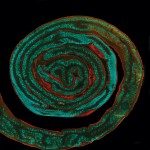Link to Pubmed [PMID] – 34548907
Link to DOI – 10.18632/oncotarget.28056
Oncotarget 2021 Sep; 12(19): 1903-1919
Chemerin, a multifunctional protein acting through the receptor ChemR23/CMKLR1, is downregulated in various human tumors and was shown to display antitumoral properties in mouse models of cancer. In the present study, we report that bioactive chemerin expression by tumor cells delays the growth of B16 melanoma and Lewis lung carcinoma in vivo. A similar delay is observed when chemerin is not expressed by tumor cells but by keratinocytes of the host mice. The protective effect of chemerin is mediated by CMKLR1 and appears unrelated to the recruitment of leukocyte populations. Rather, tumors grown in the presence of chemerin display a much smaller number of blood vessels, hypoxic regions early in their development, and larger necrotic areas. These observations likely explain the slower growth of the tumors. The anti-angiogenic effects of chemerin were confirmed in a bead sprouting assay using human umbilical vein endothelial cells. These results suggest that CMKLR1 agonists might constitute therapeutic molecules inhibiting the neoangiogenesis process in solid tumors.

